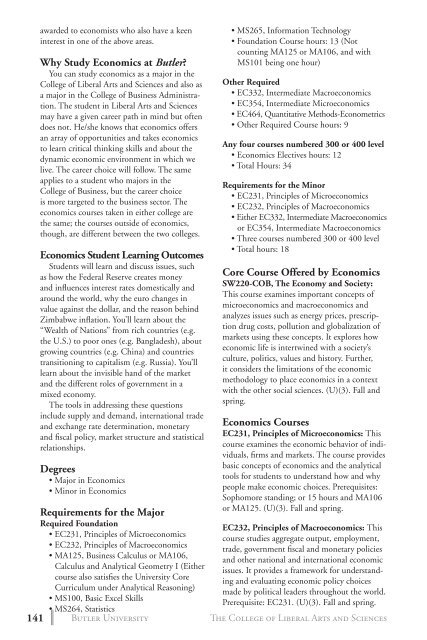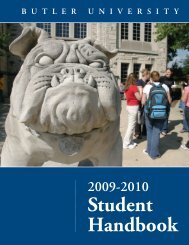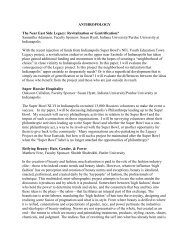2 0 1 3 bulletin - Butler University
2 0 1 3 bulletin - Butler University
2 0 1 3 bulletin - Butler University
You also want an ePaper? Increase the reach of your titles
YUMPU automatically turns print PDFs into web optimized ePapers that Google loves.
awarded to economists who also have a keen<br />
interest in one of the above areas.<br />
Why Study Economics at <strong>Butler</strong>?<br />
You can study economics as a major in the<br />
College of Liberal Arts and Sciences and also as<br />
a major in the College of Business Administration.<br />
The student in Liberal Arts and Sciences<br />
may have a given career path in mind but often<br />
does not. He/she knows that economics offers<br />
an array of opportunities and takes economics<br />
to learn critical thinking skills and about the<br />
dynamic economic environment in which we<br />
live. The career choice will follow. The same<br />
applies to a student who majors in the<br />
College of Business, but the career choice<br />
is more targeted to the business sector. The<br />
economics courses taken in either college are<br />
the same; the courses outside of economics,<br />
though, are different between the two colleges.<br />
Economics Student Learning Outcomes<br />
Students will learn and discuss issues, such<br />
as how the Federal Reserve creates money<br />
and influences interest rates domestically and<br />
around the world, why the euro changes in<br />
value against the dollar, and the reason behind<br />
Zimbabwe inflation. You’ll learn about the<br />
“Wealth of Nations” from rich countries (e.g.<br />
the U.S.) to poor ones (e.g. Bangladesh), about<br />
growing countries (e.g. China) and countries<br />
transitioning to capitalism (e.g. Russia). You’ll<br />
learn about the invisible hand of the market<br />
and the different roles of government in a<br />
mixed economy.<br />
The tools in addressing these questions<br />
include supply and demand, international trade<br />
and exchange rate determination, monetary<br />
and fiscal policy, market structure and statistical<br />
relationships.<br />
• MS265, Information Technology<br />
• Foundation Course hours: 13 (Not<br />
counting MA125 or MA106, and with<br />
MS101 being one hour)<br />
Other Required<br />
• EC332, Intermediate Macroeconomics<br />
• EC354, Intermediate Microeconomics<br />
• EC464, Quantitative Methods-Econometrics<br />
• Other Required Course hours: 9<br />
Any four courses numbered 300 or 400 level<br />
• Economics Electives hours: 12<br />
• Total Hours: 34<br />
Requirements for the Minor<br />
• EC231, Principles of Microeconomics<br />
• EC232, Principles of Macroeconomics<br />
• Either EC332, Intermediate Macroeconomics<br />
or EC354, Intermediate Macroeconomics<br />
• Three courses numbered 300 or 400 level<br />
• Total hours: 18<br />
Core Course Offered by Economics<br />
SW220-COB, The Economy and Society:<br />
This course examines important concepts of<br />
microeconomics and macroeconomics and<br />
analyzes issues such as energy prices, prescription<br />
drug costs, pollution and globalization of<br />
markets using these concepts. It explores how<br />
economic life is intertwined with a society’s<br />
culture, politics, values and history. Further,<br />
it considers the limitations of the economic<br />
methodology to place economics in a context<br />
with the other social sciences. (U)(3). Fall and<br />
spring.<br />
Economics Courses<br />
EC231, Principles of Microeconomics: This<br />
course examines the economic behavior of individuals,<br />
firms and markets. The course provides<br />
Degrees<br />
basic concepts of economics and the analytical<br />
• Major in Economics<br />
tools for students to understand how and why<br />
• Minor in Economics<br />
people make economic choices. Prerequisites:<br />
Sophomore standing; or 15 hours and MA106<br />
or MA125. (U)(3). Fall and spring.<br />
Requirements for the Major<br />
Required Foundation<br />
EC232, Principles of Macroeconomics: This<br />
• EC231, Principles of Microeconomics<br />
course studies aggregate output, employment,<br />
• EC232, Principles of Macroeconomics<br />
trade, government fiscal and monetary policies<br />
• MA125, Business Calculus or MA106,<br />
and other national and international economic<br />
Calculus and Analytical Geometry I (Either<br />
issues. It provides a framework for understanding<br />
and evaluating economic policy choices<br />
course also satisfies the <strong>University</strong> Core<br />
Curriculum under Analytical Reasoning)<br />
made by political leaders throughout the world.<br />
• MS100, Basic Excel Skills<br />
Prerequisite: EC231. (U)(3). Fall and spring.<br />
• MS264, Statistics<br />
141 <strong>Butler</strong> <strong>University</strong><br />
The College of Liberal Arts and Sciences
















